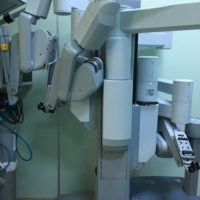When Robot Doctors Injure, Who is to Blame: The Hospital or the Patient?

AI Doctors, Robot Doctors, Surgical Robots…call them what you like, but that does not change what they are: robots that perform procedures and make diagnoses typically reserved for human hands and brains. While technology has certainly come a long ways in recent decades, and while much of it is far more intelligent than the average human brain, many people remain wary of these robo docs, and for good reason. According to the BBC, AI doctors killed 144 patients and injured more than 1,000 people in a 14-year period. While this may seem like a relatively low number compared to the number of medical malpractice incidents that arise each year, it is high considering medical robots are not actually necessary.
Medical robots were introduced to the medical scene because they were designed to reduce risk for infection and to help patients more quickly. However, robot doctors are susceptible to events that human doctors are not, such as broken instruments falling into patients’ bodies, electrical sparks causing tissue burns, and system errors that make the surgery take far longer than planned. When accidents to happen, people are several times more likely to die. This is especially true when the surgery involves the heart, lungs, head, or neck.
While the sale of robot doctors has drastically decreased in recent years—partially because the cost of claims and the equipment combined does not justify the outcomes—some medical professionals continue to use them, and so long as they do, patients will continue to get hurt.
Who is Liable for Injuries Cause by AI Doctors?
When a medical professional injures a patient, the patient has the option of filing a medical malpractice suit. In such cases, liability can be attributed to one of two people: the patient or the doctor. However, when artificial intelligence is involved, liability can fall to three entities: The patient, for consenting to the procedure in the first place, the medical professional, for utilizing a technology with known risks, and/or the manufacturer, for creating faulty equipment. If the manufacturer is deemed responsible, does the case then become a medical malpractice case or a product liability case?
Retain the Help of a Knowledgeable Medical Malpractice Attorney
Medical malpractice cases are extremely complex as is, but throw technology into the mix and a case becomes doubly complicated. While Intuitive Surgical, Inc.—the maker of the da Vinci Surgical Robot, the robot that started it all—reserved $67 million to settle product liability claims in 2014 alone, the path to that settlement for some 76 individuals was likely long and convoluted. Additionally, there is no way to know whether those individuals received a fair settlement or if they simply received enough compensation to close the case.
At Spencer Morgan Law, our Miami medical malpractice lawyers dedicate our time and services to ensuring that our clients receive the compensation they need and deserve after a medical accident has left them injured and broken. Whether you were injured by AI robots or a human medical professional, let our team fight on your behalf for a fair and swift settlement. To schedule a free consultation, contact us online or by phone.
Resources:
bbc.com/news/technology-33609495
lexisnexis.com/legalnewsroom/litigation/b/litigation-blog/archive/2014/04/09/da-vinci-surgical-robot-maker-reserves-67m-to-settle-product-liability-claims.aspx?Redirected=true
